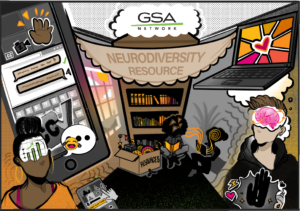 At the start of the pandemic and through the 2020-21 school year, GSA Network’s Youth Organizing staff had to pivot and embarked on a crash course in online meetings and facilitation. In the winter of 2020, three of our core youth member leaders who identify as neurodivergent gave us incredibly helpful feedback to deepen our online accessibility practices and encouraged us to study disability justice and neurodiversity. Through this partnership, we have begun to incorporate better accessibility practices into our organizational norms, templates, and standard guidelines.
At the start of the pandemic and through the 2020-21 school year, GSA Network’s Youth Organizing staff had to pivot and embarked on a crash course in online meetings and facilitation. In the winter of 2020, three of our core youth member leaders who identify as neurodivergent gave us incredibly helpful feedback to deepen our online accessibility practices and encouraged us to study disability justice and neurodiversity. Through this partnership, we have begun to incorporate better accessibility practices into our organizational norms, templates, and standard guidelines.
Even as schools return in-person, we know that GSAs and youth programs still find online meetings and platforms useful for increasing access to community spaces.
These resources were made possible through our partnership with youth leaders, the studying and knowledge sharing of Youth Organizing team members, and trying on new guidelines to make our space more accessible.
Below, we share practices that we have implemented across our organization and we strongly encourage GSA clubs and youth organizations to adopt these practices and consider how your online spaces can be more accessible. Feel free to also share your practices with us at info@gsanetwork.org! We are committed to continuing to learn and grow with you on this journey.
Resources:
- Language & Definitions
- Understanding the terms and language that we use when discussing neurodiversity is an important place to start
- Suggested Practices for Inclusive Online Spaces
- Practices that can increase the accessibility of online spaces (such as GSA meetings or virtual classes) to support neurodiversity
- Internal Education & Commitments
- Practices that all people can learn to deepen their individual/collective understanding of neurodiversity and the greater topic of disability justice
- Quick Reference Guide
- In-depth visual and concrete examples of implementation and external resources
